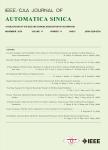Fault Estimation for a Class of Markov Jump Piecewise-Affine Systems: Current Feedback Based Iterative Learning Approach
作者机构:IEEE College of Electrical Engineering and AutomationShandong University of Science and TechnologyQingdao 266590China College of Mechanical Engineering and AutomationHuaqiao UniversityXiamen 361021China Department of Mechanical and Aerospace EngineeringNorth Carolina State UniversityRaleigh NC 27695 USA Department of Electronic and Information SystemsShibaura Institute of TechnologySaitama 337-8570Japan
出 版 物:《IEEE/CAA Journal of Automatica Sinica》 (自动化学报(英文版))
年 卷 期:2024年第11卷第2期
页 面:418-429页
核心收录:
学科分类:02[经济学] 0202[经济学-应用经济学] 020208[经济学-统计学] 07[理学] 08[工学] 080401[工学-精密仪器及机械] 0804[工学-仪器科学与技术] 080402[工学-测试计量技术及仪器] 0838[工学-公安技术] 0714[理学-统计学(可授理学、经济学学位)] 070103[理学-概率论与数理统计] 0701[理学-数学]
基 金:supported in part by the National Natural Science Foundation of China (62222310, U1813201, 61973131, 62033008) the Research Fund for the Taishan Scholar Project of Shandong Province of China the NSFSD(ZR2022ZD34) Japan Society for the Promotion of Science (21K04129) Fujian Outstanding Youth Science Fund (2020J06022)
主 题:Current feedback fault estimation iterative learning observer Markov jump piecewise-affine system
摘 要:In this paper, the issues of stochastic stability analysis and fault estimation are investigated for a class of continuoustime Markov jump piecewise-affine(PWA) systems against actuator and sensor faults. Firstly, a novel mode-dependent PWA iterative learning observer with current feedback is designed to estimate the system states and faults, simultaneously, which contains both the previous iteration information and the current feedback mechanism. The auxiliary feedback channel optimizes the response speed of the observer, therefore the estimation error would converge to zero rapidly. Then, sufficient conditions for stochastic stability with guaranteed performance are demonstrated for the estimation error system, and the equivalence relations between the system information and the estimated information can be established via iterative accumulating ***, two illustrative examples containing a class of tunnel diode circuit systems are presented to fully demonstrate the effectiveness and superiority of the proposed iterative learning observer with current feedback.



